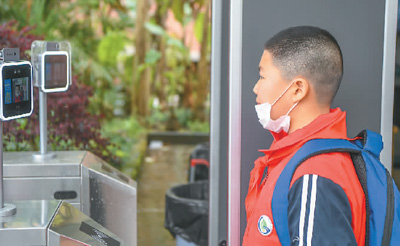

Since the outbreak of the novel coronavirus epidemic, high technologies have helped satisfy the growing demand for "non-contact" scenarios, including food delivery and remote office work, digitally upgrading the related industries.

A studnet has his face scanned and body temperature taken as he enters the school in Chongqing. (Photo/Xinhua)
On the morning of April 12, at Fresh Hema, a Chinese grocery chain in Beijing, customers waiting to enter the mall successively have their face scanned with a thermometer, while their body temperature is simultaneously displayed on an electronic screen.
This is one of the typical examples in China where people have their body temperatures taken by all kinds of temperature-measuring robots at railway stations, airports, shopping malls and other places where people get together.
In this scenario, the body temperatures are taken by a thermal imaging system. As long as a person passes through the camera area, body temperature can be accurately measured even while wearing a face mask.
This kind of non-contact service not only provides a solution for the epidemic prevention and control when there is a large amount of population, but also can effectively prevent all kinds of hidden dangers existing in manual detection. In addition to temperature measurement, this kind of robot can also implement dynamic management of a crowd through face recognition and other technologies.
The popularity of non-contact services is not only reflected in the frontline of epidemic prevention and control since the COVID-19 outbreak, but also in scenarios such as intelligent distribution, remote office work, Internet health care and online education have all ushered in a good opportunity for explosive growth.
Non-contact services are expected to be widely used in the field of distribution. According to the State Post Bureau, it will actively promote models such as smart express boxes to minimize personnel contact and maximize the safety and health of front-line employees and consumers.
The catering industry, frustrated by the epidemic outbreak, has also recovered to some extent thanks to more intelligent and safer food delivery services. The use of intelligent dining cabinets and other ways to pick up and deliver food has become the new standard service.
A few days ago, Meituan, a Chinese group buying website, has launched more than 1,000 smart food cabinets in such Chinese cities as Wuhan, Beijing and Shanghai in batches. The dining cabinets are equipped with ultraviolet disinfection and heat preservation functions, which not only ensure hygiene and safety, but also improve the operation efficiency of the whole food delivery platform.
The demand for remote office work has also promoted the relevant industries. The scale of China's online office market has maintained steady growth in recent years, according to the data released by Yicai, a Chinese financial news media and Ding Talk, an online collaboration platform. Due to the epidemic this year, the market size is expected to exceed 50 billion yuan (about 7 billion U.S. dollars).
According to the analysis of experts, at present, the development of China's non-contact service industry is at the global advanced level. Chinese products in the fields of mobile payment, e-government, telecommuting, e-commerce, intelligent logistics, shared transportation, online education and telemedicine are of high popularity and maturity in business models.
 Fire brigade in Shanghai holds group wedding
Fire brigade in Shanghai holds group wedding Tourists enjoy ice sculptures in Datan Town, north China
Tourists enjoy ice sculptures in Datan Town, north China Sunset scenery of Dayan Pagoda in Xi'an
Sunset scenery of Dayan Pagoda in Xi'an Tourists have fun at scenic spot in Nanlong Town, NW China
Tourists have fun at scenic spot in Nanlong Town, NW China Harbin attracts tourists by making best use of ice in winter
Harbin attracts tourists by making best use of ice in winter In pics: FIS Alpine Ski Women's World Cup Slalom
In pics: FIS Alpine Ski Women's World Cup Slalom Black-necked cranes rest at reservoir in Lhunzhub County, Lhasa
Black-necked cranes rest at reservoir in Lhunzhub County, Lhasa China's FAST telescope will be available to foreign scientists in April
China's FAST telescope will be available to foreign scientists in April "She power" plays indispensable role in poverty alleviation
"She power" plays indispensable role in poverty alleviation Top 10 world news events of People's Daily in 2020
Top 10 world news events of People's Daily in 2020 Top 10 China news events of People's Daily in 2020
Top 10 China news events of People's Daily in 2020 Top 10 media buzzwords of 2020
Top 10 media buzzwords of 2020 Year-ender:10 major tourism stories of 2020
Year-ender:10 major tourism stories of 2020 No interference in Venezuelan issues
No interference in Venezuelan issues
 Biz prepares for trade spat
Biz prepares for trade spat
 Broadcasting Continent
Broadcasting Continent Australia wins Chinese CEOs as US loses
Australia wins Chinese CEOs as US loses